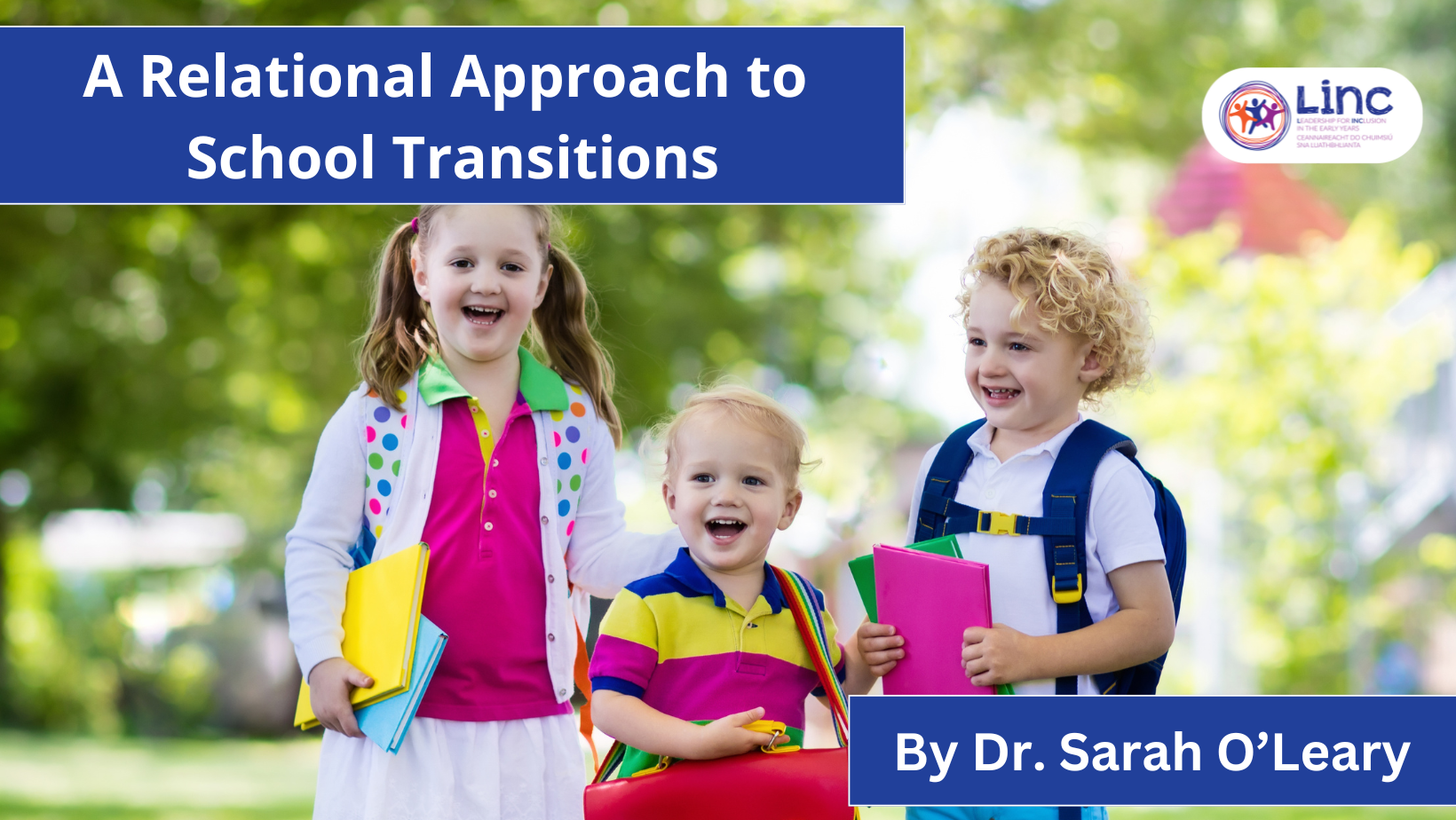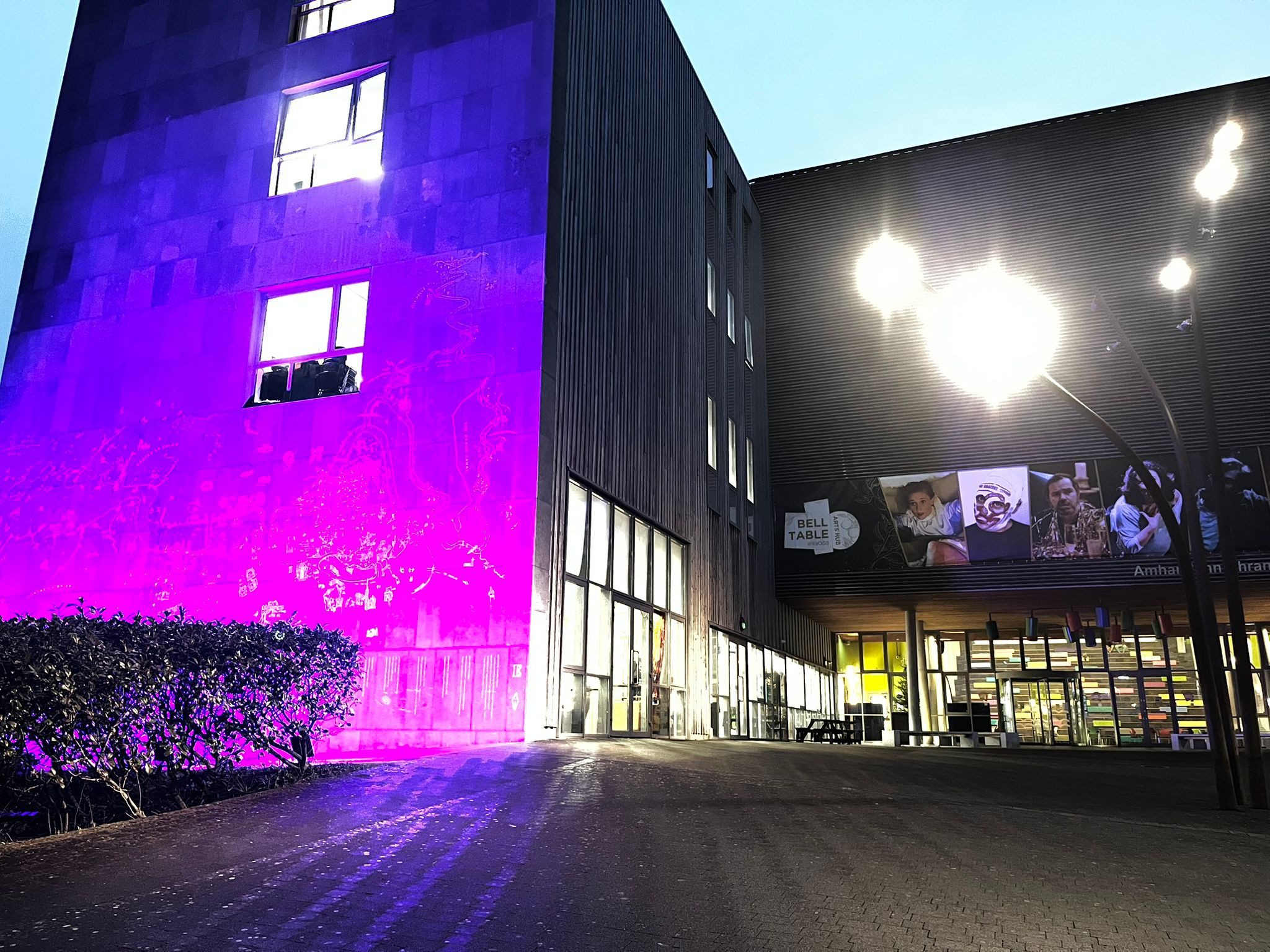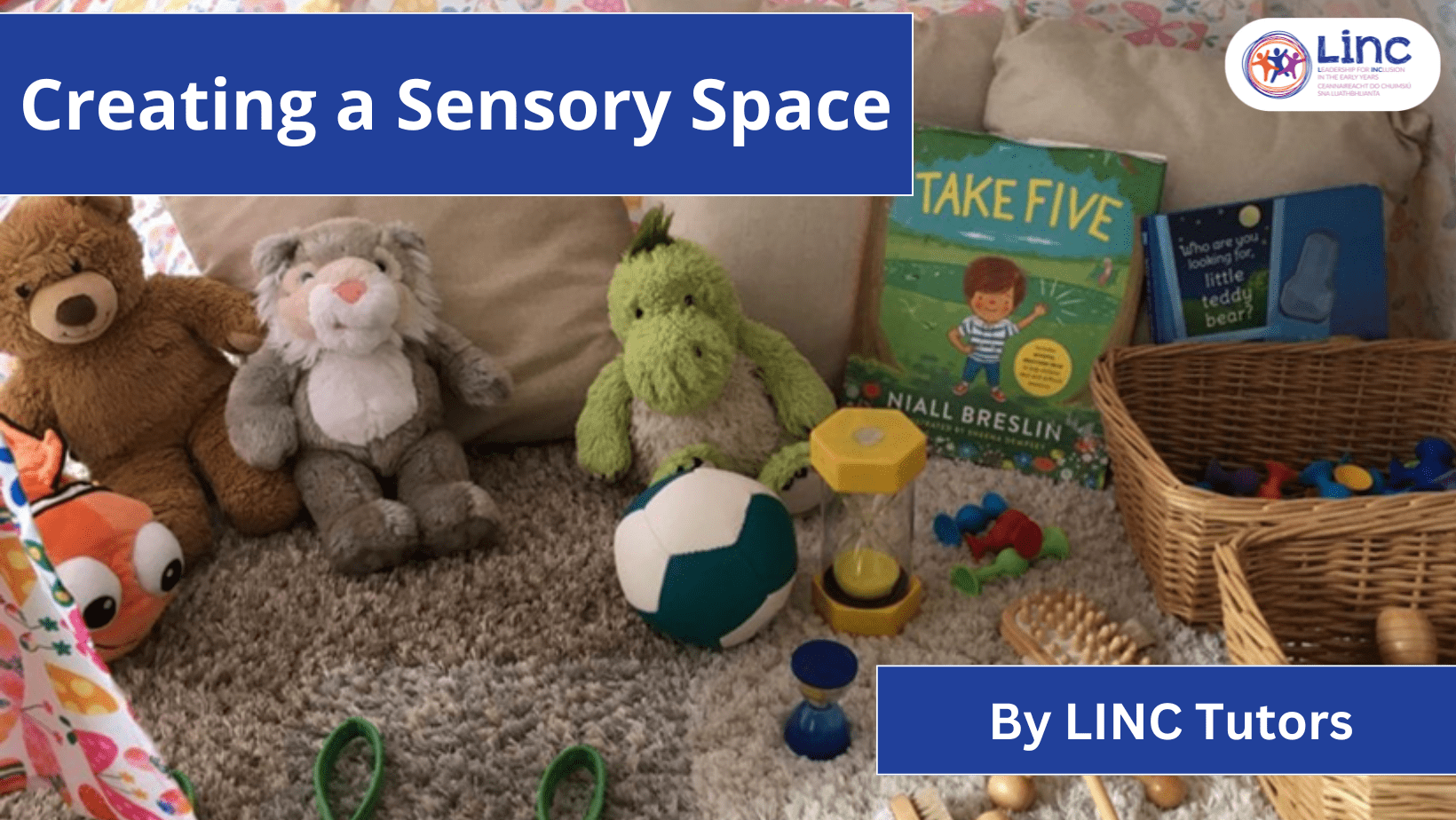A Relational Approach to School Transitions
In this edition of the LINC Blog, Assistant LINC Tutor & Researcher/Lecturer in Inclusion Education, Dr. Sarah O’Leary explores the critical role of relational pedagogy in easing children’s transition to primary school. Discover how strong connections and supportive relationships can make all the difference for young learners.

“I can’t manage this on my own”
Every parent relates to feeling nervous dropping their little one to school for the first time. You’re hoping that things will go okay for them. You don’t want to hover too long or hold their hand too tightly in case they miss you too much on that first day. When you have a child with additional needs those feelings are amplified-the saying that “no news is good news” doesn’t ring true. In the silence you may picture the worst-case scenario; your child (or perhaps their teacher) feeling utterly overwhelmed. For some parents, when the “news” finally comes it is bad and sometimes the worst-case scenario becomes a reality and that dreaded conversation takes place. The one about whether your child is ready or not for school, or worse still; whether your child will ever be ready for school… well school as you knew it.
This scenario might not come to mind when we think of inclusive education and the transitions within it, nor should it. But unfortunately, for some families, this stark reality remains: usually due to a difficult or unsuccessful transition to primary school (Robinson et al., 2024- Review of Access and Inclusion Model). Undoubtedly, a lot of work has been carried out nationally in recent years to support all children to transition from their Early Childhood setting to their chosen primary school, as Figure 1 below demonstrates:
Figure 1
Moreover, the new Primary Curriculum Framework (DE, 2023) now includes transitions as one of its nine key principles. It appears that all the infrastructure is in place to ensure successful transitions occur. Why then do some of us still have that knot in our stomach? Perhaps it comes back to those two loaded words: school readiness.
As an educator, it is heartening to see that school readiness is finally being discussed in terms of schools being ready to meet the needs of children. Research highlights how primary school teachers share this reformed view of school readiness as an approach to practice within their settings and reveals a clear correlation between the thoughts of early years educators and primary school educators around the concept (Ring et al., 2016). Both see the importance of an individualised approach where children’s holistic development, and in particular their strengths, are key. Within this approach, preparation for transitions no longer focuses on children’s ABCs but rather their capacity to feel socially and emotionally secure.
It is clear then that educators across early childhood settings and infant classrooms are attuned to the importance of care within the educational journeys of young children. Caring relationships are a central feature of the teaching profession, and should be a key feature of the transition process to primary education. Emphasising the importance of relationships in education ensures that the child’s sense of belonging develops through positive and impactful interactions. Indeed, the new Primary Curriculum Framework (strongly influenced by Aistear) stresses the importance of relational teaching and learning. It is through this relational pedagogy that children not only learn – but develop secure trusting relationships with those who teach them.
The supports available to families of children with additional needs during this transition should reiterate the benefits of this relational approach. Such an approach can only emerge if there are strong partnerships between the child, their family and the educational settings they are transitioning from and to.
Every educator within the early years and primary sector has hopes and expectations for the children they teach. They hope that they will not just “manage”, but prosper. Expecting a child with additional needs to “manage” as they transition to primary school is too much, too soon. The expectation should not be about self-management, but instead the development of relationships based on positive interactions that help the child to feel safe and secure and to become this competent and confident individual. we speak of… this agentic learner who will “manage” on their own.
For some parents, like me, this will never be the goal and that is okay. Some of us will rely on the relationships that our child has made with others until the day we die, and even more so, the day after that.
And so, relational pedagogy becomes more than just a tool for transition, or even an approach to curriculum, it is a way of life. It reaches far beyond the goal of self-management in education and instead encompasses care and learning across the lifespan of the individual with additional needs. It can be found in the positive interactions early childhood and primary educators engage in on a daily basis; the friendly wave, the words of praise and encouragement, the reassuring chat, the commitment to persevere, the “we can do this” attitude. It is the shared hope that even on the harder days, we can work together to support this child to meaningfully participate- not just in our setting or the one they transition to next, but in life.
References:
- Robinson, D., Gowers, S., Codina, G., Artess, J., Delgado Fuentes, M., Mycock, K., Qureshi, S., Shepherd, R. (2024) End-of-year Three Evaluation of the Access and Inclusion Model (AIM) Research and Technical Report. [online] available at: https://aim.gov.ie/app/uploads/2024/01/End-of-year-Three-Evaluation-of-the-Access-and-Inclusion-Model-AIM-Research-and-Technical-Report-1.pdf
- Department of Education (2023) Primary Curriculum Framework: For primary and special schools. [online] available at: https://www.curriculumonline.ie/getmedia/84747851-0581-431b-b4d7-dc6ee850883e/2023-Primary-Framework-ENG-screen.pdf
- Department of Education, National Educational Psychologist Service (2019) Guidance for Parents of Children Transitioning from Pre-school to Primary School. [online] available at: https://www.gov.ie/pdf/?file=https://assets.gov.ie/77926/a9fd6c42-4262-457b-95b5-49b44f148b0c.pdf#page=null
- National Council for Special Education (2023) Starting Primary School: Guidelines for parents and guardians of children with special educational needs. [online] available at: https://ncse.ie/wp-content/uploads/2024/03/Starting_Primary_School.pdf
- Ring, E., Mhic Mhathúna, M., Moloney, M., Hayes, N., Breathnach, D., Stafford, P., Carswell, D., Keegan, S., Kelleher, C., McCafferty, D., O’Keeffe, A., Leavy, A., Madden, R. and Ozonyia, M. (2016) An examination of concepts of school readiness among parents and educators in Ireland. Dublin: Department of Children and Youth Affairs. Available at: www.dcya.ie
Dr. Sarah O'Leary
Assistant LINC Tutor & Researcher/Lecturer in Inclusion Education
Dr. Sarah O’Leary is a researcher and lecturer specialising in inclusive education, with a particular focus on the early years. With 20 years of experience in the field, her primary area of interest is autism and the development of inclusive practices in both early learning and care settings as well as primary schools. Sarah is a mother of two young boys, one of whom is on the autism spectrum and communicates non-verbally. She is also the founder of ‘E.V.E.R.Y Ability in Autism’, an initiative dedicated to fostering strengths-based approaches to daily life in collaboration with children on the autism spectrum, their families, educators, and the wider community.
You may also like:

LINC Shines a Light on Inclusion for the International Day of Persons with Disabilities 2025
LINC Shines a Light on Inclusion for the International Day of Persons with Disabilities 2025 The Leadership for INClusion in the Early Years (LINC) Programme marked the United Nations International Day of Persons with Disabilities (IDPD) this evening by illuminating...

Creating a Sensory Space
Creating a Sensory Space In this edition of the LINC blog, Claire Butterly, Karina Abbott, Ann Donnellan, Carole Dee, Linda Madden, Margaret Joyce and Paula Harte highlight some considerations when planning a sensory space in your Early Learning and Care setting....

Deck the Walls: Inclusive Christmas Displays that Celebrate Every Child
Deck the Walls: Inclusive Christmas Displays that Celebrate Every Child In this edition of the LINC Blog, former LINC Tutor Paula Harte explores how Christmas displays can bring warmth, creativity, and connection to Early Learning and Care (ELC) and School-Aged...

